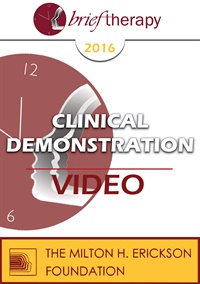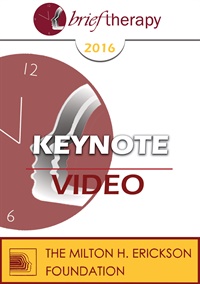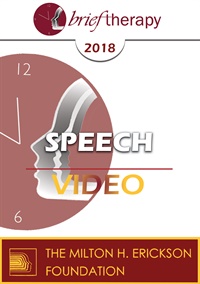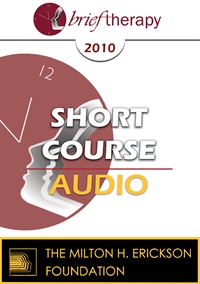
- Average Rating:
- Not yet rated
- Topic Areas:
- Couples Therapy | Short Courses | Gestalt | Intimacy | Relationships | Neurobiology | Neuroscience
- Categories:
- Brief Therapy Conference | Brief Therapy Conference 2010
- Faculty:
- Roberta Karant, PhD | Stefan Deutsch
- Duration:
- 1:33:35
- Format:
- Audio Only
- Original Program Date:
- Dec 09, 2010
- Short Description:
- Couples in distress minimize and numb their pain by avoiding contact. By writing a vision of what they both want, the therapist can focus the couple on the future. By combining Gestalt concepts with those popularized by Hendrix and others, therapists can have a powerful effect on quickening the healing process. New sessions will involve writing, note taking, and an agreed upon assignment to be practiced during the week. With Roberta Karant and Stefan Deutsch.
- Price:
- $15.00 - Base Price
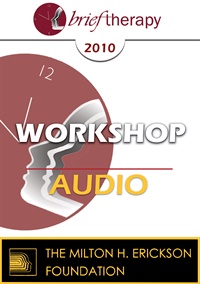
- Average Rating:
- Not yet rated
- Topic Areas:
- Couples Therapy | Workshops | Brief Therapy | Relationships | Treatment Planning
- Categories:
- Brief Therapy Conference | Brief Therapy Conference 2010
- Faculty:
- Pat Love, EdD
- Duration:
- 1:57:30
- Format:
- Audio Only
- Original Program Date:
- Dec 10, 2010
- Short Description:
- This brief model has a powerful effect on couples. Misleading in its simplicity but potent in its outcome, the Three C’s approach uses the couples’ own words to design and realign the relationship in a strategic manner. Lecture, live demonstration, experiential exercise and discussion will be used for meaningful exchange.
- Price:
- $15.00 - Base Price
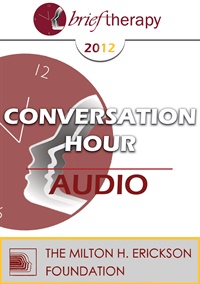
- Average Rating:
- Not yet rated
- Topic Areas:
- Conversation Hours | Relationships
- Categories:
- Brief Therapy Conference | Brief Therapy Conference 2012
- Faculty:
- Jeffrey Kottler, PhD
- Duration:
- 57:06
- Format:
- Audio Only
- Original Program Date:
- Dec 07, 2012
- Short Description:
- BT12 Conversation Hour 09 – Relationships in the Therapist’s Life – Jeffrey Kottler, PhD Educational Objectives: Learn the philosophies of various practitioners and theorists.
- Price:
- $15.00 - Base Price
Tags: Relationships
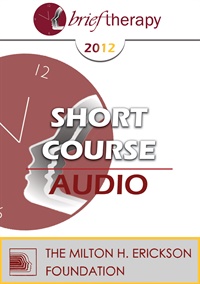
- Average Rating:
- Not yet rated
- Topic Areas:
- Short Courses | Brief Therapy | Footprinting | Relationships
- Categories:
- Brief Therapy Conference | Brief Therapy Conference 2012
- Faculty:
- Susan Dowell, MSW
- Duration:
- 1:03:35
- Format:
- Audio Only
- Original Program Date:
- Dec 09, 2012
- Short Description:
- Footprintings is a new three dimensional treatment model. In this work, nine different color sets of Footprintings become tools for a patient to bookmark, diagram, track and explore internal experience and shifting states of consciousness, as they are experienced in the Present Moment. When a patient chooses color Footprintings to represent an aspect of self-experience, positions these Footprintings on the ground and then stands in them, the postural shifts , body experience, and shifting perspectives and associations unfolding from this positioning can lead to valuable insights, learning opportunities and new perspectives.
- Price:
- $15.00 - Base Price
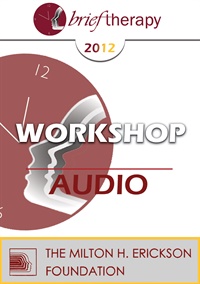
- Average Rating:
- Not yet rated
- Topic Areas:
- Workshops | Feedback Informed Treatment (FIT) | Relationships | Tailoring | Therapeutic Relationship | Therapist Development
- Categories:
- Brief Therapy Conference | Brief Therapy Conference 2012
- Faculty:
- Scott Miller, PhD
- Duration:
- 2:43:41
- Format:
- Audio Only
- Original Program Date:
- Dec 06, 2012
- Short Description:
- The field of therapy is undergoing a period of dramatic change: regulatory and documentation requirements, government cutbacks and changing insurance policies, declining incomes and economic uncertainty. Thankfully, a simple, evidence-based alternative exists for maximizing the effectiveness and efficiency of treatment based on using ongoing client feedback to empirically tailor services to the individual client needs and characteristics. Over a dozen randomized clinical trials, involving a wide range of clients and presenting complaints, document that the principles and practices associated with Feedback Informed Treatment (FIT) improve outcomes and client satisfaction by as much as 65%, cuts dropout rates in half, and decreases the risk of deterioration by one third.
- Price:
- $15.00 - Base Price
- Average Rating:
- Not yet rated
- Topic Areas:
- Clinical Demonstrations | Feedback Informed Treatment (FIT) | Relationships | Therapeutic Relationship | Tailoring | Therapist Development
- Categories:
- Brief Therapy Conference | Brief Therapy Conference 2014
- Faculty:
- Michael Yapko, PhD
- Course Levels:
- Master Degree or Higher in Health-Related Field
- Duration:
- 55:44
- Format:
- Audio and Video
- Original Program Date:
- Dec 13, 2014
- Short Description:
- This demonstration shows how real-time client feedback can transform therapy into a collaborative, adaptive process. Using tools like the Outcome Rating Scale and Session Rating Scale, a volunteer experiences how progress and alliance can be tracked session by session. Participants see how feedback helps identify stuck points, prevent dropout, and improve outcomes across diverse settings—including work with adolescents, mandated clients, and even brief crisis contacts.
- Price:
-
Sale is $29.00
price reduced from Base Price - $59.00

- Average Rating:
- Not yet rated
- Topic Areas:
- Invited Addresses | Relationships | Brief Therapy | Couples Therapy
- Categories:
- Brief Therapy Conference | Brief Therapy Conference 2014
- Faculty:
- Pat Love, EdD
- Duration:
- 56:15
- Format:
- Audio Only
- Original Program Date:
- Dec 14, 2014
- Short Description:
- Relationships have changed since the dawn of the 21st century. Dating, mating, single life, sex-life, monogamy, matrimony, cohabitation, co-operation—all look different than a generation ago. As if it weren't challenging enough to keep up with pathological, technological, ethnic, educational, gender, geographic, socioeconomic, and sexual diversity, we now have the largest generational gap in modern history to contend with which means the relationship expectations and mores that made total sense to the Boomers now baffle many Millennials.
- Price:
- $15.00 - Base Price
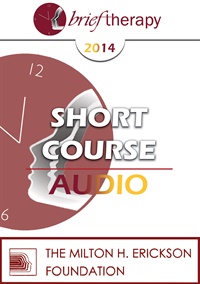
- Average Rating:
- Not yet rated
- Topic Areas:
- Short Courses | Brief Therapy | Couples Therapy | Intimacy | Relationships | Solution Oriented Approach
- Categories:
- Brief Therapy Conference | Brief Therapy Conference 2014
- Faculty:
- Robert Johansen, PhD
- Duration:
- 1:45:02
- Format:
- Audio Only
- Original Program Date:
- Dec 11, 2014
- Short Description:
- The presentation introduces a new, solution-focused model for treating individuals/couples. The model proposes specific and clear steps on how to differentiate types of love and how these impact intimacy. Participants will develop lasting strategies on how to effectively manage personal needs in the context of the intimate relationship.
- Price:
- $15.00 - Base Price
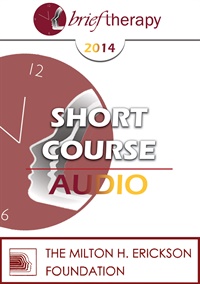
- Average Rating:
- Not yet rated
- Topic Areas:
- Short Courses | Brief Therapy | Footprinting | Relationships
- Categories:
- Brief Therapy Conference | Brief Therapy Conference 2014
- Faculty:
- Susan Dowell, MSW
- Duration:
- 1:27:36
- Format:
- Audio Only
- Original Program Date:
- Dec 11, 2014
- Short Description:
- Footprintings is a projective exploratory model, designed to help patients get unstuck from a self-limiting personal narrative. Nine color sets of Footprintings become literal tools to represent and track shifting states of consciousness and to access untapped resources and body wisdom. This workshop will be both didactic and experiential.
- Price:
- $15.00 - Base Price

- Average Rating:
- Not yet rated
- Topic Areas:
- Sex and Sexuality | Workshops | Brief Therapy | Couples Therapy | Intimacy | Relationships
- Categories:
- Brief Therapy Conference | Brief Therapy Conference 2014
- Faculty:
- Pat Love, EdD
- Duration:
- 1:42:06
- Format:
- Audio Only
- Original Program Date:
- Dec 12, 2014
- Short Description:
- Human sexual response is a complex system even when attempting to understand one person let alone two people in a relationship. It is helpful, therefore to have a way to organize decades of research and clinical practice in a manner which can be shared with clients. A practical schema will be presented to educate and motivate clients interested in improving their intimate connection. Lecture, video, original handouts and experiential exercises will be utilized.
- Price:
- $15.00 - Base Price
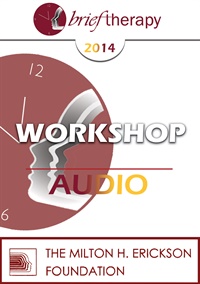
- Average Rating:
- Not yet rated
- Topic Areas:
- Workshops | Mindfulness | Intimacy | Couples Therapy | Relationships
- Categories:
- Brief Therapy Conference | Brief Therapy Conference 2014
- Faculty:
- Ronald Siegel, PsyD
- Duration:
- 1:54:20
- Format:
- Audio Only
- Original Program Date:
- Dec 12, 2014
- Short Description:
- Psychotherapists and clinical researchers are finding that ancient Eastern meditative techniques, originally solitary practices refined by hermits, monks, and nuns, are proving to be remarkably useful for facing interpersonal challenges. This workshop will explore how mindfulness meditation can help our clients and us develop the affect tolerance and capacity to be with and understand others that are critical for successful intimate relationships. You’ll leave knowing the three core elements of mindfulness practice, how to use mindfulness to react less personally to the inevitable ups and downs of interpersonal life, and how interpersonal mindfulness techniques can enhance therapeutic, romantic, and parent-child interaction.
- Price:
- $15.00 - Base Price
- Average Rating:
- Not yet rated
- Topic Areas:
- Clinical Demonstrations | Brief Therapy | Communication | Family Therapy | Relationships
- Categories:
- Brief Therapy Conference | Brief Therapy Conference 2016
- Faculty:
- Wendel Ray, PhD
- Course Levels:
- Master Degree or Higher in Health-Related Field
- Duration:
- 1:02:59
- Format:
- Audio and Video
- Original Program Date:
- Dec 10, 2016
- Short Description:
- The Communication Theory Based Family and Brief Therapy developed by the Palo Alto Group pioneered specific techniques for quickly comprehending relationship and contextual commands and constraints inherent in how people communication about the problem they are experiencing. This demonstration will reveal how a therapist uses listening and joining skills to identify and use messages implied about the relationship nexus of which the problem is a part to join and engender constructive change.
- Price:
-
Sale is $29.00
price reduced from Base Price - $59.00
- Average Rating:
- Not yet rated
- Topic Areas:
- Keynotes | Domestic Violence | Research | Abuse | Couples Therapy | Relationships
- Categories:
- Brief Therapy Conference | Brief Therapy Conference 2016
- Faculty:
- John Gottman, PhD | Julie Gottman, PhD
- Course Levels:
- Master Degree or Higher in Health-Related Field
- Duration:
- 1:41:28
- Format:
- Audio and Video
- Original Program Date:
- Dec 08, 2016
- Short Description:
- Drs. John and Julie Gottman will present a state-of-the-art review of how to conceptualize and treat the highly intractable problem of domestic violence toward intimate partners. They will review the research literature and present a conceptualization of the issues in treating this population. They will describe a highly successful randomized clinical trial study and the results that demonstrate long-term follow up effectiveness.
- Price:
-
Sale is $29.00
price reduced from Base Price - $59.00
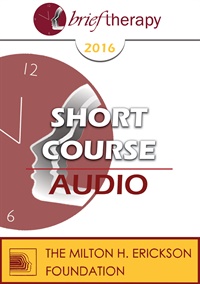
- Average Rating:
- Not yet rated
- Topic Areas:
- Short Courses | Brief Therapy | Relationships | Therapist Development | Footprinting
- Categories:
- Brief Therapy Conference | Brief Therapy Conference 2016
- Faculty:
- Susan Dowell, MSW
- Duration:
- 1:09:37
- Format:
- Audio Only
- Original Program Date:
- Dec 08, 2016
- Short Description:
- Footprintings, a dynamic new treatment approach, provides effective, easy to use tools for identifying, observing, experiencing and repairing relational perspectives between Ego States. Using color footprints chosen by the client, to diagram relationships between Parts, patients can step into different Ego States while working on clarifying and healing these internal relationships.
- Price:
- $15.00 - Base Price
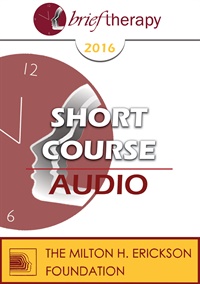
- Average Rating:
- Not yet rated
- Topic Areas:
- Short Courses | Brief Therapy | Communication | Relationships | Therapeutic Relationship | Humor
- Categories:
- Brief Therapy Conference | Brief Therapy Conference 2016
- Faculty:
- John Lentz, D. Min.
- Duration:
- 1:40:07
- Format:
- Audio Only
- Original Program Date:
- Dec 08, 2016
- Short Description:
- One liners that change people is the epitome of brief therapy. All of us have had times when one thing was said at the right moment by the right person and suddenly the world was seen differently. This workshop invites you to recognize elements that make those magic moments possible.
- Price:
- $15.00 - Base Price
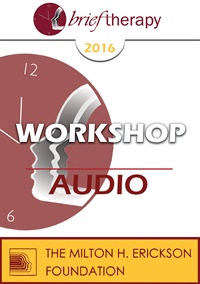
- Average Rating:
- Not yet rated
- Topic Areas:
- Workshops | Ericksonian Hypnosis and Therapy Techniques | Experiential Therapy | Relationships
- Categories:
- Brief Therapy Conference | Brief Therapy Conference 2016
- Faculty:
- Stephen Lankton, MSW
- Duration:
- 1:55:06
- Format:
- Audio Only
- Original Program Date:
- Dec 09, 2016
- Short Description:
- Milton Erickson taught that symptoms were a breakdown of relations between people. Looking at personal or family traumatic problems through this lens it is relatively easy to recognize the existence and connection between past and present disordered relationships. More importantly, the required experiential resources that individuals need to correct these conditions becomes apparent. Once identified, therapy can concentrate on helping trauma-suffering clients acquire needed experiences and help clients learn to use them systematically and appropriately.
- Price:
- $15.00 - Base Price
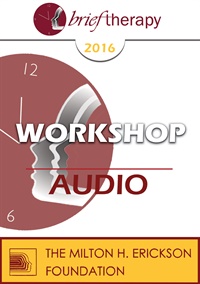
- Average Rating:
- Not yet rated
- Topic Areas:
- Psychology | Workshops | Brief Therapy | Therapeutic Relationship | Relationships
- Categories:
- Brief Therapy Conference | Brief Therapy Conference 2016
- Faculty:
- Bill O'Hanlon, MS
- Duration:
- 2:17:22
- Format:
- Audio Only
- Original Program Date:
- Dec 11, 2016
- Short Description:
- In brief therapy, we have to be better than long-term therapists in getting people to change and cooperate with treatment. Recent research from social psychology, behavioral economics and the new brain science show three powerful principles for being persuasive. Why do marketers know all this and most therapists do not? Come and learn how to be at least as persuasive as marketers.
- Price:
- $15.00 - Base Price
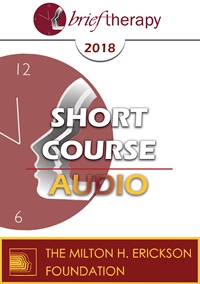
- Average Rating:
- Not yet rated
- Topic Areas:
- Short Courses | Humor | Psychotherapy | Brief Therapy | Relationships
- Categories:
- Brief Therapy Conference | Brief Therapy Conference 2018
- Faculty:
- Steven Sultanoff, Psychologist
- Duration:
- 1:18:02
- Format:
- Audio Only
- Original Program Date:
- Dec 06, 2018
- Short Description:
- Integrating therapeutic humor into psychotherapy is more than simply using humor with clients. This presentation will explore how and why integrating humor into clinical practice can be effective as well as assist clinicians to use humor with clinical awareness. Participants will learn a model of clinical humor that provides a foundation for the use of humor in psychotherapy and discover how humor (when purposely chosen as a clinical intervention) can be used as a relationship enhancing intervention, as well as a diagnostic and treatment tool.
- Price:
- $15.00 - Base Price
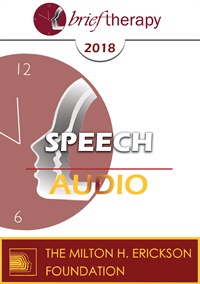
- Average Rating:
- Not yet rated
- Topic Areas:
- Speeches | Couples Therapy | Relationships
- Categories:
- Brief Therapy Conference | Brief Therapy Conference 2018 | Pioneers in Couples and Family Therapy
- Faculty:
- Stan Tatkin, PsyD, MFT
- Duration:
- 1:11:45
- Format:
- Audio Only
- Original Program Date:
- Dec 09, 2018
- Short Description:
- This one-hour speech focuses on what all couple therapists should at least consider: social justice and fairness agreements between partners. The human primate is warlike, self-centered, mostly automatic, and given to flights of fancy, moodiness, and other unpredictable feelings, thoughts, and behaviors. Thus, the social science predicate of civilization dictates that, to hold human beings accountable, there must be agreements between individuals that protect them from one another.
- Price:
- $15.00 - Base Price
Credit available - Click Here for more information
- Average Rating:
- Not yet rated
- Topic Areas:
- Speeches | Relationships | Trauma | Continuing Education | Brief Therapy | Intimacy
- Categories:
- Brief Therapy Conference | Brief Therapy Conference 2018 | Online Continuing Education
- Faculty:
- Laura Brown, PhD
- Course Levels:
- Master Degree or Higher in Health-Related Field
- Duration:
- 1:03:11
- Format:
- Audio and Video
- Original Program Date:
- Dec 08, 2018
- Short Description:
- BT18 Speech 14 - Helping Trauma Survivors to Have the Relationships They Deserve - Laura Brown, PhD Survivors of complex childhood trauma --systemic abuse, neglect, and disrupted attachment schemata -- enter adulthood with internal working models of relationship that often lead them into difficult and painful connections with others. I will address the specific challenges in empowering these survivors to stop "paying the price of admission" to intimacy, and discuss how therapists can find effective strategies for addressing pre-verbal and early verbal core beliefs about self, being lovable, and being safe in relationships.
- Price:
-
Sale is $29.00
price reduced from Base Price - $59.00
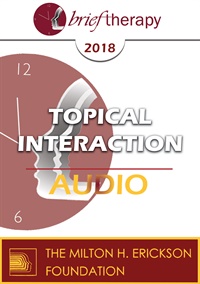
- Average Rating:
- Not yet rated
- Topic Areas:
- Topical Interactions | Feedback Informed Treatment (FIT) | Tailoring | Relationships | Therapeutic Relationship | Therapist Development
- Categories:
- Brief Therapy Conference | Brief Therapy Conference 2018
- Faculty:
- Scott Miller, PhD
- Duration:
- 57:17
- Format:
- Audio Only
- Original Program Date:
- Dec 08, 2018
- Short Description:
- Available evidence indicates that the effectiveness of psychotherapy has not improved despite 100 years of theorizing and research. What would help? Not learning a new model of therapy or the “latest” so-called “evidence-based” treatment approach. A simple, valid, and reliable alternative exists for maximizing the effectiveness and efficiency of treatment based on using ongoing feedback to empirically tailor services to the individual client needs and characteristics. Research from multiple randomized clinical trials documents that this simple, transtheoretical approach as much as doubles the effectiveness of treatment while simultaneously reducing costs, drop-out rates and deterioration. At this "Topical Interaction," participants will have a chance to address any practical issues, questions or challenges associated with incorporating outcome and alliance measures into their practice.
- Price:
- $15.00 - Base Price

- Average Rating:
- Not yet rated
- Topic Areas:
- Workshops | Brief Therapy | Generative Psychotherapy | Psychotherapy | Relationships | Therapist Development
- Categories:
- Brief Therapy Conference | Brief Therapy Conference 2018
- Faculty:
- Robert Dilts, BA
- Duration:
- 2:01:29
- Format:
- Audio Only
- Original Program Date:
- Dec 07, 2018
- Short Description:
- BT18 Workshop 14 - Applying Principles of Generative Coaching to Brief Therapy - Robert Dilts The core focus in Generative Coaching is creativity: How do you create a successful and meaningful work life? How do you create great personal relationships? How do you develop a great relationship with yourself—your body, your past, your future, your wounds, and your gifts? Generative change means creating something beyond what currently exists, whether in personal or professional life. It is not merely a cosmetic change, but a contextual shift that allows new levels of performance. Generative Coaching focuses on how to build the generative states needed to produce change and on how to maintain these states in order transform the obstacles and barriers that will inevitably arise.
- Price:
- $15.00 - Base Price
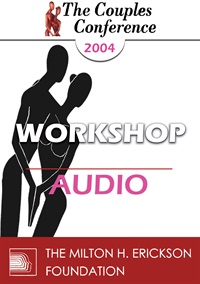
- Average Rating:
- Not yet rated
- Topic Areas:
- Workshops | Couples Therapy | Marriage | Passive-Aggressiveness | Relationships
- Categories:
- Couples Conference | Couples Conference 2004
- Faculty:
- Peter Pearson, PhD
- Duration:
- 1:58:12
- Format:
- Audio Only
- Original Program Date:
- Mar 27, 2004
- Short Description:
- The classic passive-aggressive person is a help-rejecting complainer who will not follow through with carefully crafted agreements and seems to be immune to targeted insights. They often end up with a despairing partner.
- Price:
- $15.00 - Base Price

- Average Rating:
- Not yet rated
- Topic Areas:
- Workshops | Anxiety | Couples Therapy | Depression | Divorce | Marriage | Relationships
- Categories:
- Couples Conference | Couples Conference 2004
- Faculty:
- Pat Love, EdD
- Duration:
- 1:46:45
- Format:
- Audio Only
- Original Program Date:
- Mar 27, 2004
- Short Description:
- Anxiety and depression are fast becoming the leading causes of personal disability and the single greatest destructive force in relationships. Research indicates that when one person in a relationship is depressed, the divorce rate goes up nine times. Therefore, it is vital that therapists learn to recognize typical and atypical symptoms early in therapy. It also is imperative that symptoms of relational depression are recognized. Lecture, video, written exercises and demonstration will be used.
- Price:
- $15.00 - Base Price
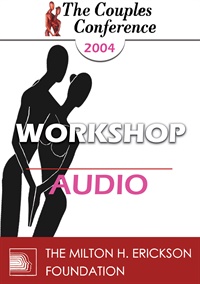
- Average Rating:
- Not yet rated
- Topic Areas:
- Workshops | Narcissism | Differentiation | Relationships
- Categories:
- Couples Conference | Couples Conference 2004 | Pioneers in Couples and Family Therapy
- Faculty:
- Ellyn Bader, PhD
- Duration:
- 1:43:12
- Format:
- Audio Only
- Original Program Date:
- Mar 27, 2004
- Short Description:
- Dive into the complexities of narcissistic relationships through case studies and therapeutic techniques. Learn how to help couples navigate emotional barriers, develop empathy, and build deeper intimacy by understanding the developmental roots of narcissistic behavior and practicing effective differentiation strategies.
- Price:
- $15.00 - Base Price



